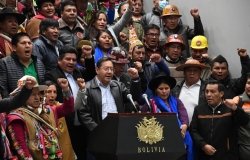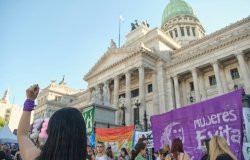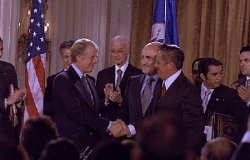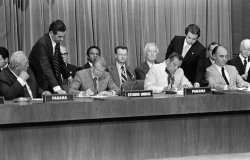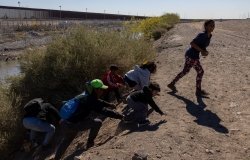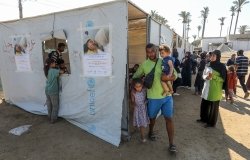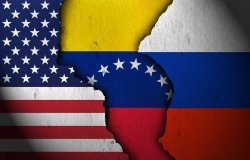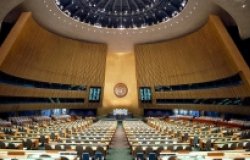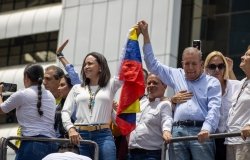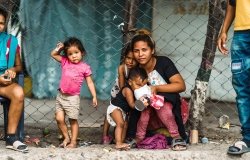The Global Financial Crisis: Implications for Latin America
*** Please view our live webcast.*** Pamela Cox, regional vice president for the Latin American and Caribbean Region, The World Bank; Rebeca Grynspan, director, Bureau for Latin America and the Caribbean, United Nations Development Program; Arturo Porzecanski, distinguished economist-in residence, American University; Jorge I. Domínguez, Antonio Madero professor of Mexican and Latin American politics and economics, Harvard University; Robert A. King, acting senior director for Western Hemisphere Affairs, National Security Council; Cynthia Arnson, director, Latin American Program, Woodrow Wilson Center; Merilee Grindle, director, David Rockefeller Center for Latin American Studies, Harvard University; Eric Farnsworth, vice president, Council of the Americas/Americas Society.
Overview


Until mid-2008, Latin American countries appeared well-equipped to weather a burgeoning economic crisis in the United States and elsewhere and emerge relatively unscathed. Solid levels of economic growth, sound fiscal and monetary policies, lower levels of debt, and stronger reserves due to high commodity prices caused many to believe that Latin America had successfully "de-coupled" its economic future from the fate of the United States and other advanced industrial countries. By September 2008, the full impact of the financial meltdown in the United States had begun to be felt in Latin America. On February 5, 2009, the Latin American Program joined with the Harvard University's David Rockefeller Center for Latin America Studies and the Council of the Americas/Americas Society to explore the economic, social, and political implications of the global financial crisis for the countries of the region.In a keynote address, Pamela Cox, World Bank vice president for Latin America and the Caribbean, acknowledged much uncertainty about how to respond to a crisis the scope of which has never been seen in the lifetime of most economists. Already, the crisis has brought to a "screeching halt" five years of economic growth in Latin America; forecasts for growth rates in 2009 plunged from 3.7 percent in September 2008 to 1 percent in December, with some economies likely to experience negative growth. She called for timely, decisive action to protect the social gains of the last several years and to prevent the financial crisis from becoming a human and social one. Cox suggested an increase in support to the most vulnerable—although not just the very poor—through well-targeted social protection packages to ensure broad access to health insurance, protect public spending in key areas such as nutrition and vaccines, and expand existing conditional cash transfer programs. Allowing that there is much debate over the role of the state and the balance between public and private sector initiatives, she urged governments not to unduly cut budgets and to maintain policies aimed at long-term growth, such as investments in infrastructure and quality education. To bolster the labor market, she suggested public works programs and initiatives supporting self-employment and micro-enterprise development. The World Bank will be increasing both grants and concessional loans over the next three years to meet these challenges. Cox noted that trade wars during the Great Depression contributed to a global downward spiral, and said that the April 2009 Summit of the Americas provided a regional opportunity to emphasize the importance of open trade.
Director for the United Nations Development Program's Bureau for Latin America and the Caribbean Rebeca Grynspan discussed the crisis' social implications, noting that not just overall growth but per capita income was declining. Inequality and poverty remain high throughout the region, and a key weakness of the region's economies is the heavy dependence on commodity income. The overall impact of the crisis will depend on how long it lasts, how governments behave, and how the international community responds to Latin America. Currently, she said, 85 million people receive subsidies through targeted conditional cash transfer programs, but the state cannot be seen to be working only on behalf of the poor. The middle class is also suffering, and a large population goes back and forth above and below the poverty line. The International Labor Organization estimates that the number of people living in "work poverty"—those active in the labor market but earning an income below the poverty line established by the World Bank—will rise from 6.8 percent in 2007 to 8.7 percent in 2009, constituting 7 million working poor. An additional 4 million people will lose their jobs in 2009 if growth rates, as projected, are only around 1 percent. Grynspan argued for a larger system of social protection to prevent huge reversals of the gains in reducing poverty in recent years. Programs should emphasize women and young people, who are twice as likely to be unemployed, while infrastructure investment should include small and community-based projects, not just large-scale ones. In 2009-10 over a dozen elections will be held in Latin America. The middle class and residents in urban areas, not just the poor, will determine the outcomes.
Arturo Porzecanski, distinguished economist-in-residence at American University's School of International Service, emphasized the crisis' different impacts across Latin America, and divided the region into three groups with different levels of ability to respond to or cushion the crisis. The first group consists of countries such as Mexico, Central America, and the Caribbean, that depend on the United States and Europe as export markets, sources of workers' remittances, and tourism revenue. A second group consists of the "irresponsible left" of Nicaragua, Venezuela, Ecuador, Argentina, and Bolivia, whose governments have spent most of the bonanza from five years of sustained growth and do not have entries into the capital markets or good relations with foreign investors; unless commodity prices recover, these countries will be under tremendous pressure internally. A third group is made up of the "responsible left and right"—Colombia, Peru, Chile, Uruguay, and Brazil—where governments have saved some of the windfall of recent years, have more credible central banks, flexible exchange rates, and a greater ability to apply counter-cyclical fiscal and monetary policies and manage liability.
Jorge I. Domínguez, Antonio Madero professor of Mexican and Latin American Politics and Economics at Harvard University, noted a number of positive political developments in the region, including the absence of military coups since 1976 and the spread of civilian, constitutional, elected government. In the "old Latin America," he said, one would have expected a coup in Argentina as a result of the economic crisis in 2000-02. Current leaders (with the exception of presidents in Mexico, Colombia, and El Salvador) have for the most part been less market-oriented than their predecessor, but public opinion has not shown a left-right divide on such critical issues as citizen security, trade, and abortion. Indeed, the only issue on which an ideological left-right divide mattered appeared to be on attitudes toward the Bush administration. Domínguez described five voting cycles in Latin America since the transitions to democracy began 30 years ago. These cycles show patterns of defeat and victory for incumbents, only partially correlated with economic trends (incumbents tended to win in South America since the early 2000s, a period of macroeconomic stability and the commodity boom.) The circulation of elites serves democracy well, he observed, and even leaders who have governed well are likely to lose in coming years as a result of the recession.
Robert King, acting senior director for Western Hemisphere Affairs at the National Security Council, said that the new administration was still in the process of determining what it wanted to accomplish in Latin America and how to follow through regarding principles laid out during the campaign. Overarching goals—to advance democracy, economic opportunity, and security—are likely to remain unchanged, although the new president has emphasized in discussions with several Latin American presidents the importance of working together in partnership. In signaling a new approach, President Obama has made clear that the United States does not have all the answers and can learn from the experience of regional leaders. A top priority is to work toward energy security in Latin America, and both energy and climate change are critical areas of future U.S.-Latin American cooperation. The upcoming Summit of the Americas will provide an opportunity to unveil new initiatives. The administration is committed to expanding trade benefits to all countries, and will increase the emphasis on the labor and environmental provisions of trade agreements. There is also a desire to advance opportunity from the bottom-up as well as to substantially increase aid to the region.
Documents & Downloads
- The Global Financial Crisis: Implications for Latin AmericaDownload
- The Global Financial Crisis: Implications for Latin AmericaDownload
- The Global Financial Crisis: Implications for Latin AmericaDownload
- The Global Financial Crisis: Implications for Latin AmericaDownload
- The Global Financial Crisis: Implications for Latin AmericaDownload
- The Global Financial Crisis: Implications for Latin AmericaDownload
- The Global Financial Crisis: Implications for Latin AmericaDownload
Hosted By

Latin America Program
The Wilson Center’s prestigious Latin America Program provides non-partisan expertise to a broad community of decision makers in the United States and Latin America on critical policy issues facing the Hemisphere. The Program provides insightful and actionable research for policymakers, private sector leaders, journalists, and public intellectuals in the United States and Latin America. To bridge the gap between scholarship and policy action, it fosters new inquiry, sponsors high-level public and private meetings among multiple stakeholders, and explores policy options to improve outcomes for citizens throughout the Americas. Drawing on the Wilson Center’s strength as the nation’s key non-partisan policy forum, the Program serves as a trusted source of analysis and a vital point of contact between the worlds of scholarship and action. Read more
Thank you for your interest in this event. Please send any feedback or questions to our Events staff.
